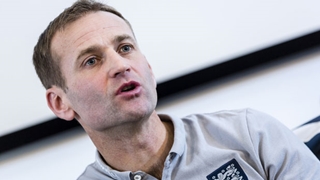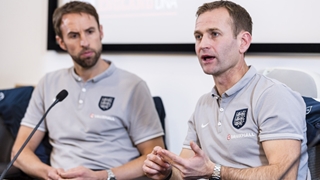
Dan Ashworth outlined The FA’s new ‘England DNA’ and says giving young international footballers more playing experiences can help produce more successful teams.
Ashworth, The FA’s director of elite development, unveiled the plans which focus on the England men’s and women’s development teams, and are aimed at creating senior teams who regularly challenge for victory at major tournaments.
He was joined at St. George’s Park by Under-21s head coach Gareth Southgate and head of player and coach development Matt Crocker as they highlighted the five core strands of the programme.
From ensuring players wear the Three Lions with pride and understand what it means to be an England player, through the playing style and philosophy, to how players are supported through their international development, the trio spoke passionately about the programme that has been over a year in the making.
And one of the fundamental messages was of consistency, as they aim to establish a philosophy that runs through all the England teams.
Ashworth said: “One of the mantras we have is ‘the only thing that changes is the size of the shirt’, so as they come through that player pathway, from an U15 boy or girl, all the way through to the seniors, we have some consistent messages around them.
“This is not The FA telling people what to do, telling clubs what to do or to say how to produce and develop players. This is for us to set down some of the things we believe in and will help produce senior international players.
“International football is different from club football, there are some different requisites, different tests for the players in the male and female games as they get through to Mark [Sampson] and Roy [Hodgson]’s senior teams.
“If everyone is on the same page and everyone buys into and believes what you are trying to do it can become so much more powerful.”
“On average our players were 20 caps down compared to our competitors”
Dan Ashworth
When the DNA project began, Ashworth and The FA’s national coaches discussed the characteristics needed for players to progress from the U15s level through to the senior team.
They spoke about how they want England teams to play and how they want to coach them. They garnered opinion from Hodgson and Sampson, as well as the Premier League, Football League, clubs and the grassroots game.
A study was also conducted that found that the most successful senior teams, on average, had players with more international experience throughout the age groups.
It led to the creation of more England development teams, which will increase match opportunities and contact time, and also a new games programme to incorporate opposition from around the world.
“When I first arrived at The FA 18 months ago we looked at international success. Was there any correlation between the countries who had had success at international level?” Ashworth said.
“We looked at seven European countries, ourselves included, and three South American countries - the ones who had been most successful in getting to tournaments.
“We looked at the differences between those teams and the nations who went on to win things. The successful teams tended to have players who had more experience at international level, more caps.
“One of the reasons was because our competitors had more teams than us, so we have introduced a U15s, U18s and U20s to keep those teams and players connected.
Also, if you are getting to more tournaments, more semi-finals, more finals, you are invariably going to build up more caps and experiences at the junior levels.”
He continued: “We worked out that if you came in as an U15 boy and played in every single game and qualified for every single tournament across the age groups, then you would have had around 60 experiences, 60 games.
“On average our players were 20 caps down compared to our competitors once they move into the senior team.
“Now with the three extra teams and tweaking around with some of the friendlies, we are now up to around the mid-80s.
“We’ll keep tweaking it, keep listening to opinions and keep improving it”
Dan Ashworth
“We also felt that if we were going to compete at world level, the boys and girls would need to experience playing against countries from various different continents, so we tweaked the games programme to give them a more varied experience."
The England DNA will be presented to around 1,500 coaches this weekend as they gather for a series of coach development events at St. George’s Park.
The FA Licensed Coaches Club conference, the Coaching Awards and the Talent Identification Conference will enable Ashworth to share the philosophy with coaches at all levels of the game.
And he hopes listening to their opinions and ideas will help shape the ever-evolving concepts.
“I don’t think anything like this is ever finished. One of the goals for us is to make sure any new ideas, anything that we come across from stakeholders, will help continue to change and evolve it.
“We had The Future Game book published in 2010, which had some super ideas in it. This is the next stage of that - it’s a development plan for players and it can change on a regular basis.
“I don’t think anyone is claiming we’ve got the answers, but we’ll keep tweaking it, keep listening to opinions and keep improving it.”










